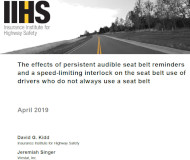6/7/2019
Insurance Industry Wants More Buzzers And Chimes In CarsInsurance Institute for Highway Safety cites a limited study to claim more seatbelt buzzing will save 1489 lives.

The Insurance Institute for Highway Safety (IIHS) believes today's cars do not have enough buzzers, beeps and chimes. The group, which serves as the lobbying and public relations arm of the insurance industry, is calling on the US Department of Transportation to change federal mandates to lengthen the duration of seat belt chimes by a factor of ten. The group claims longer buzzing alone will save 1489 lives.
IIHS based its finding on a two-week survey and study released in April. It compared the effectiveness of seatbelt interlocks that restrict cars to a top speed of 15 MPH until the front occupants are buckled up to the buzzers that last ninety seconds under the same conditions. The report acknowledges that government mandates do not always produce the desired result.
"Two participants described how the speed-limiting interlock suddenly slowed the vehicle because groceries or other objects were mistaken for an unbelted front-seat passenger," the study authors noted. "Another two participants felt that a sudden slowdown caused by the speed-limiting interlock almost resulted in a crash."
The study's participants consisted of forty-nine "part time" seatbelt users who were placed in a 2015 Chevrolte Cruze with the seven-second seatbelt buzzer, a 2014 BMW X5 with a ninety-second seatbelt alarm and a 2017 Subaru Impreza with a buzzer that never shuts off until the belt is fastened. The participants drove two of the test vehicles for one week each, only told that they were evaluating "new car technology." This particular set of test subjects were about a third more likely to use their seatbelts with the more annoying buzzer settings, or an interlock. IIHS then extrapolated the 33 percent increase in seatbelt usage to the population as a whole to conclude 1489 lives would be saved by modifying existing regulations to extend the duration of buzzing in the automobile.
One out of four participants defeated the buzzers by buckling the belt behind their back, waiting for the enhanced buzzer to stop, or they just turned up the volume on the stereo. Because this caused unwanted results in the study, their behavior was excluded from the conclusions. Two out of three drivers of the Subaru with the 90 second buzzer said the system was annoying. In a related IIHS survey, respondents explained that they unbuckled their belts in locations where they believed the devices served no purpose, including the driveway, in parking lots or on residential streets.
A copy of the study is available in a 1.3mb PDF file at the source link below.


